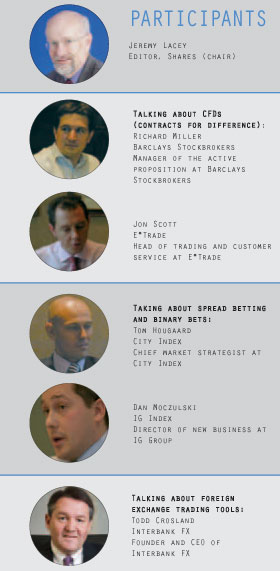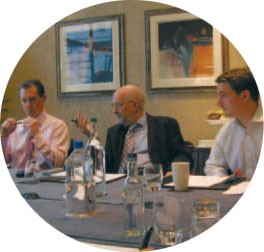Want to know more about the products available to you as an investor and how best to use them? For the experienced trader and novice alike, Shares invited a team of industry experts to explain all..
 |
Jeremy Lacey, Shares: Let's start by talking about the kind of investors or traders who might be interested in these products. How do they work and who are they most suitable for?
Richard Miller, Barclays Stockbrokers: If used sensibly, CFDs are suitable for a cross-section of investors, from very sophisticated day traders right the way down to people who are quite new to trading, although we certainly wouldn't advocate beginners trying CFDs to start off with.
A CFD is different from a normal share transaction - you don't pay any stamp duty and CFDs are usually traded on margin, so you don't have to put up the full transaction amount when you take out a position. The third main difference is you can go short, in other words you can take advantage of a market falling as well as rising.
Jon Scott, E*Trade: The CFD gives you great flexibility but also, because you can trade on margin, there are increased risks. Therefore a little bit more experience will inevitably help the trader.
Lacey: What about spread bets?
Dan Moczulski, IG Index: Firstly, anyone can trade a spread bet. Unlike the majority of CFD firms, we don't require clients to have 'intermediate' classification, so anyone who is new to financial markets can trade. That's not to suggest, though, that everybody should trade on a spread bet - they are risky products and you have got to be comfortable with financial markets to use them.
It's difficult to make a real distinction between a spread bet and a CFD. However, there are two fundamental differences between the products. One, you are never charged a commission - the way that a spread betting firm makes money is merely on the spread. The other difference is that with a spread bet there is a particular time frame - it will be on a daily bet that you can roll over or on a monthly or quarterly contract.
Lacey: Do you see any fundamental difference in the type of client who would be interested in either product?
Moczulski: The minimum bet sizes on spread bets are quite often less than those required for a CFD, so it lends itself to someone just starting out. But I suggest whether you trade a spread bet or a CFD is more to do with ancillary services. For example, if you want advice, you can only get that through a CFD. If you want to trade on a direct market access (DMA) platform, you can do that through a CFD but not through a spread bet. It's all to do with what you are looking to achieve. If what you look for in a product is execution-only, cheap, easy and with tax-free profit, then a spread bet is the obvious choice.
Lacey: And on the forex side?
Todd Crosland, Interbank FX: We offer direct interbank trading for individual and institutional customers worldwide. We did a study recently and found that over the last 18 months 47% of our standard account holders were profitable.
From what we have read, we believe we have the most profitable forex traders in the industry. In fact, the CEO of another large US firm was quoted in the Wall Street Journal as saying he would be surprised if 15% of traders were profitable in this market. It was that quote that prompted our study.
We provide a number of tools and education resources that help our customers make trading decisions.
Those include our online forum, our international economic calendar, real-time streaming news and an ever-growing education section on our website. We also have one of the only platforms that allows automated trading. The customers can use one of the existing automated trading programs or create their own. These programs will trade the account around the clock for the customer. We have programming support available on our online forum.
It's strange to say but one of the worst things that can happen to a new client is that they make money on the first two or three trades and think they are invincible
|
Lacey: We hear a lot of comments from the more traditional type of stock market investors who say, 'I won't touch any of those derivatives, it's all gambling. I'm just interested in investing.' What do you say to them?
Tom Hougaard, City Index: Of course, the first thing I'm bound to say is that this is not gambling - we do not represent institutions that offer gambling in any shape - but you can't blame them for thinking it's gambling because it's called spread betting. We need to have that classification, otherwise it would be impossible to offer spread betting as a tax-free instrument.
But the second thing is far more subtle and that is the degree of the interest in the financial markets. Where we differentiate ourselves from, say, a traditional stockbroker is that we offer a service to those people who are actively pursuing the financial markets. It doesn't matter whether it's stocks or indices, commodities or currencies, it's fair game.
This is not for those who are interested in holding something for the next 30 or 40 years. But for those who have been trading a little bit, managing a small portfolio, there are great incentives to take up spread betting or CFD trading.
 |
Lacey: Would you prefer to call spread betting something else?
Hougaard: I would love to call it spread trading because calling it betting is misleading.
Moczulski: All the products that we have here give you the ability to gamble - plenty of people gamble using traditional means of trading. If you have a view on a market to go up or down, generally speaking there is a 50% chance it will go up and a 50% chance it is going down. If you have a risky strategy, it will be risky whether you do it on a spread bet or a CFD or a conventional trade.
However, if you trade in a riskaverse manner, perhaps with stop losses, guaranteed stops or products that are not particularly volatile, then the risk is controlled. It's all down to the way that the investor uses the product.
Hougaard: Binary betting could be gambling.
Moczulski: Again it depends on your type of trading. We make you a price that refers to whether something will or will not happen. For example, will the FTSE finish up today? Either it does finish up or it doesn't - a simple yes or no outcome. That is in essence more of a gamble because there's not too much thought that you have to put into it. However, an options trader using binaries as a way to sell short-term volatility would be quite offended if you referred to him as a gambler.
Crosland: This is an interesting question. Gambling is a very subjective term. You could define a stakeholder pension plan as gambling or even your savings account to some extent. Even breathing the air in the city or crossing a busy street could be classed as gambling by some. I don't think that currency trading is gambling in the Vegas sense of the word. I think that there are tools that the trader can employ to help him/her make wiser choices in the market.
Lacey: Is the gambling question as much of an issue with CFDs?
Miller: One thing to add is that with CFDs you have the benefit of being able to offset any losses that you make against capital gains tax, which you don't get when you use spread bets or binary betting. This can be very useful, especially when you're using CFDs as a hedging facility.
Scott: If you approach the products as a gambler, not an investor, then invariably from a risk-management perspective you are at a disadvantage compared with those who approach them as an investor.
Lacey: Let's say I am an experienced investor in shares but I think my money could be made to work harder by trading derivatives and looking at different asset classes. What sort of things do I need to consider before I decide what type of account to open?
Crosland: Many traders decide to diversify into forex for a number of reasons. The forex market is a 24-hour market and is far more volatile than any other market on the planet. It trades to the tune of $1.9 trillion per day. This means you can trade on your schedule without having to worry about liquidity. Forex trading is also done on margin and while that means more potential risk, it also means far larger potential gain. Once you have decided to trade forex there are a number of things you should consider prior to opening a forex account, such as what type of account you wish to open (mini or standard) and how much leverage you require.
 |
Moczulsk: Gearing and the ability to go short are the main reasons why anyone will look at spread betting and CFDs rather than conventional share trading. Having to pay 40% of your profits to Gordon Brown is also very attractive in the case of spread betting. Also, more and more people are recognizing that they can trade at home - they don't have to go through a conventional broker or listen to a broker's advice.
They can make their own trading decisions. They don't have to pore over books for years and years to learn how a financial market works. They can open an account with any one of us and be trading within five or six minutes.
Because people are using their own time to invest in financial markets, they want to invest in products that have the quickest return. With geared products, just a couple of points' movement in the market can be multiplied 10 or 20 times. I suppose these products could be described as offering more bang for your buck.
Scott: The thrill of being in and out of the market as many times a day as you want can be quite compelling. You could be drawn into over-trading but a more experienced investor will safeguard himself against such pitfalls by exercising discipline and control.
Lacey: Maybe it's also the fun element of the portfolio for more experienced investors who have a solid core of traditional stocks but also want a bit of play money.
Scott: Certainly, people do divide up their pots for long-term or medium-term strategies. Many active traders set aside a higher-risk pot of 'play money' for which they can use these products. It also comes down to the way in which risk is managed. This is crucial for approaching any type of leveraged product because with increased reward comes increased risk. E*Trade helps our customers strike the right balance of risk management by offering account types that cater to different investment needs.
Miller: That defines an experienced investor - someone who is able to move into derivative types of products such as CFDs yet keep a perspective on a full portfolio of their investments.
Somebody who wants to move into CFDs should also be looking at things like investment funds to keep a balanced portfolio across all their investments. People who don't get that balance right are among those who lose money on derivative products, because putting all their money into one type of product isn't always a sensible thing to do. That's why at Barclays we provide access to investment trusts and normal equities right through to the derivative products, so that people can have a balanced portfolio under one roof for all their investment needs.
Moczulski: Certain strategies will lend themselves to physical trades. If you are looking at income, you'd be foolish to do so through a CFD or a spread bet. You should not be putting 50% of your wealth into either of these products - maybe 10%, maybe less, maybe more. It's down to the individual investor and their risk profile.
Lacey: Sometimes when we talk about the advantages of trading on margin, we downplay the risks.
Miller: People can use margin as a way of amplifying the amount of positions they take or the number of positions they take. They can free up extra cash that they don't need and funnel that into other products which may be less risk-averse.
Moczulsk: When people look at these products, nobody looks at the opportunity to lose money - everybody looks at the opportunity to profit. If someone does have concerns about margin and whether they may receive a call asking for more money, I'd recommend using guaranteed stop losses from the outset so they know what the potential risk is. Or they could use a binary bet or buy an option so that whatever happens, they know from the start they are only risking a certain amount of money.
At the seminars and open evenings we run at IG, one of the things we hammer home is risk management. What I recommend any client does on any trade is work out what happens if the market goes against you by a certain amount, first by a reasonable amount and then a worse-case amount. If you can't afford the loss on the worst case, don't do the trade, or reduce your bet size until you can. Always have a mental stop loss,
whether you actually include it on the trade or not.
As long as you are aware of how margin works, there is no need for a trade to be riskier than it is with any other product. Let's say you buy £10,000 worth of physical Vodafone stock and it loses 10%, therefore it's only worth £9,000 - you've lost £1,000. With a spread bet or a CFD, where you buy on perhaps 10% margin and put down £1,000, if the market drops 10% you'd lose that £1,000. Your loss is identical whether you trade the physical or the margin product but it's all your money that's gone on the spread bet or the CFD.
Scott: E*Trade actively educates our investors about the impact of risk awareness. We continually disseminate suggestions, such as using different order types, as part of a risk strategy. In fact, we're very soon to launch an updated version of the E*Trade Professional platform and as part of that update, we are introducing a trailing stop loss.
There shouldn't always be the perception that a CFD broker inevitably skims the fat off of customer losses. If customers lose money in this way, it could deter them from trading with us again. We're not in the business of losing our customers.
Miller: It's a popular misconception that when a client loses the broker gains. Different companies have got slightly different business models but in the end we all want the clients to win.
The content of this site is copyright 2016 Financial Spread Betting Ltd. Please contact us if you wish to reproduce any of it.